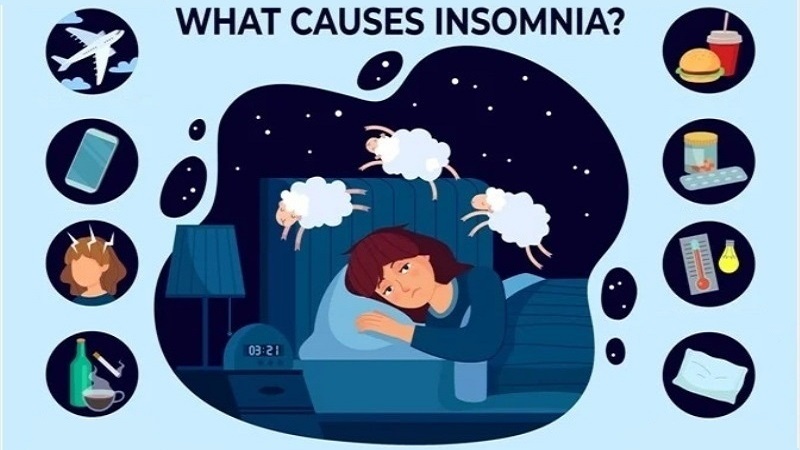What are some common causes of insomnia?
Insomnia is a common sleep disorder that have It is characterized by difficulty falling asleep or staying asleep, leading to poor quality sleep and daytime fatigue. Insomnia can be caused by a variety of factors, including physical and psychological factors, lifestyle habits, and underlying medical conditions. In this article, we will explore some of the common causes of insomnia and how they can be treated.
Stress and Anxiety
Stress and anxiety are among the most common causes of insomnia. When we experience stress or anxiety, our bodies produce hormones like cortisol and adrenaline, which can interfere with our ability to fall asleep or stay asleep. Chronic stress and anxiety can lead to long-term sleep problems and even develop into a chronic sleep disorder.
Depression
Depression is another common cause of insomnia. People with depression often experience changes in their sleep patterns, including difficulty falling asleep or staying asleep, waking up early, or sleeping excessively. Insomnia can also worsen depression symptoms and make it more challenging to recover from this condition.
Medical Conditions
Many medical conditions can cause insomnia, including chronic pain, asthma, heartburn, and menopause. These conditions can make it difficult to fall asleep or stay asleep, leading to poor sleep quality and daytime fatigue. Treating the underlying medical condition can often improve sleep quality and reduce insomnia symptoms.
Medications
Certain medications can interfere with sleep, leading to insomnia. These include medications used to treat high blood pressure, asthma, depression, and anxiety. Stimulants like caffeine and nicotine can also disrupt sleep and cause insomnia.
Poor Sleep Habits
Poor sleep habits can contribute to insomnia. These habits include irregular sleep schedules, taking naps during the day, and using electronic devices before bed. Poor sleep hygiene can lead to difficulty falling asleep or staying asleep and can worsen insomnia symptoms.
Environmental Factors
Environmental factors can also contribute to insomnia. These include noise, light, temperature, and an uncomfortable bed or pillows. Changes in the environment, such as traveling to a new time zone, can also disrupt sleep and cause insomnia.
Substance Abuse
Substance abuse, including alcohol and drug use, can interfere with sleep and cause insomnia. Alcohol can disrupt sleep patterns and lead to waking up frequently during the night, while stimulants like cocaine and methamphetamine can cause insomnia by keeping the body and mind alert.
Genetics
Genetics can play a role in the development of insomnia. People with a family history of insomnia are more likely to experience this condition themselves. However, the exact genes and genetic mechanisms that contribute to insomnia are still not fully understood.
Treatment for Insomnia
The treatment for insomnia depends on the underlying cause. In some cases, making lifestyle changes like practicing good sleep hygiene, avoiding caffeine and alcohol, and creating a comfortable sleep environment can improve sleep quality and reduce insomnia symptoms. In other cases, medical treatment may be necessary to address underlying medical conditions or manage stress and anxiety.
Cognitive Behavioral Therapy (CBT)
This therapy involves working with a mental health professional to identify and change negative thoughts and behaviors that can contribute to insomnia. CBT for insomnia may include relaxation techniques, sleep restriction therapy, and stimulus control therapy.
Medications
Medications are sometimes used to treat insomnia. These include sleep aids like benzodiazepines and non-benzodiazepine hypnotics, which can help people fall asleep more quickly and stay asleep longer. However, these medications can be habit-forming and should be used only under the guidance of a healthcare professional.
Lifestyle Changes
Lifestyle changes can also help to treat insomnia. These include maintaining a regular sleep schedule, avoiding caffeine and alcohol before bedtime, engaging in regular exercise during the day, and creating a comfortable sleep environment. Other strategies that may be helpful include relaxation techniques like deep breathing, meditation, or yoga, and seeking support from a therapist or support group for stress, anxiety, or depression.
It is also essential to address any underlying medical conditions that may be contributing to insomnia. This may involve treating conditions like chronic pain or asthma, adjusting medications that may be causing sleep disturbances, or managing menopausal symptoms.
In some cases, alternative treatments like acupuncture or herbal remedies may be used to treat insomnia. However, it is important to discuss these treatments with a healthcare professional before trying them, as they may interact with other medications or have side effects.
Preventing Insomnia
Preventing insomnia involves maintaining healthy sleep habits and addressing any underlying conditions that can contribute to sleep disturbances. Some tips for preventing insomnia include:
- Stick to a regular sleep schedule, on weekends.
- Create a relaxing bedtime routine to signal to your body.
- Avoid caffeine, nicotine, and alcohol, before bedtime.
- Exercise regularly during the day, but avoid intense exercise in the evening.
- Create a comfortable sleep environment that is cool, dark, and quiet.
- Limit screen time and exposure to bright lights in the hours leading up to bedtime.
- Seek treatment for any underlying medical or psychological conditions that may be causing insomnia.
Conclusion : Insomnia is a common sleep disorder that can have a significant impact on a person’s quality of life. It can be caused by a variety of factors, including stress, anxiety, medical conditions, medications, poor sleep habits, environmental factors, substance abuse, and genetics. Treatment for insomnia depends on the underlying cause, and may include lifestyle changes, cognitive-behavioral therapy, medication, or a combination of these approaches.
Preventing insomnia involves maintaining healthy sleep habits and addressing any underlying conditions that can contribute to sleep disturbances. By taking steps to prevent and treat insomnia, individuals can improve their sleep quality and overall health and well-being. If you are experiencing symptoms of insomnia, it is essential to speak with a healthcare professional to determine the best course of treatment for your individual needs.




